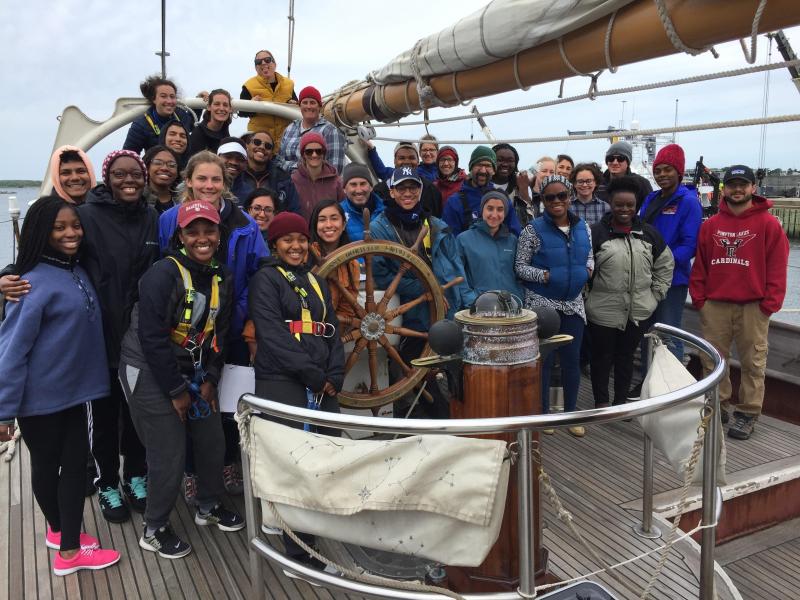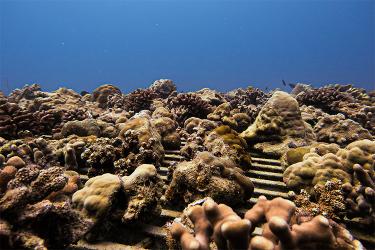Program Dates May 29, 2021 - August 7, 2021
The Woods Hole Partnership Education Program (PEP) is seeking applicants for its 10-week summer program that combines undergraduate course work with research in marine and environmental science. The project is supported by six science institutions in Woods Hole, Massachusetts, in partnership with the University of Maryland Eastern Shore.
“We are calling for applications for our 13th PEP class, hoping to bring students to Woods Hole in the summer of 2021,” said George Liles, who directs the PEP internship and the NOAA Northeast Fisheries Science Center’s Academic Programs Office. In 2020, the program was conducted virtually.
Launched in 2009, PEP is designed to promote a diverse scientific community. It recruits college talent from all backgrounds, but especially from minority groups that are under-represented in marine and environmental sciences. African American, Hispanic American, Native American, Asian Pacific Island, and Alaska Native students are particularly encouraged to apply.
Priority is given to entering juniors and seniors majoring in the natural sciences or engineering, mathematics, or social sciences. Applicants must also have completed some course work in either oceanography, biology, or marine and/or environmental science.
The program includes a 4-week course and a 10-week research internship. Each student has a mentor to guide them on their research project, and a program advisor to provide guidance, support, and career advice during the summer. In 2021, an in-person PEP program will cover each student’s tuition and room and board, and provide a travel allowance and a $5,000 stipend. If the program is virtual, the stipend and tuition will be covered.
Application deadline is February 13, 2021. The 2021 PEP Class will be announced in mid-March.
Application information and reports on previous programs are available on the Woods Hole PEP website.
Organizers will decide how the program will be offered no later than May 1, 2021. Whether in-person or virtual, the 2021 PEP program will run May 29 through August 7:
- The PEP course, “Ocean and Environmental Sciences: Global Climate Change,” is offered for credit through the University of Maryland Eastern Shore and runs from June 1 to June 30. The course is taught in Woods Hole by research scientists from local science institutions.
- PEP students will conduct research projects that employ some of the techniques and explore some of the issues presented in the course.
- At the end of the program, the students will present results from their research in a 20-minute public presentation during a one-day PEP seminar on August 6.
PEP Ready for Virtual or In-Person 2021 Program
For PEP’s first 11 years its students came to Woods Hole. Their summer was filled with course work, research projects, research cruises, and a variety of career-building workshops, symposia, and field trips.
“Last year, in response to the pandemic, we rebuilt PEP as a virtual program,” Liles said. “In 2020, our sixteen 2020 PEP interns participated remotely in the full program with the same core components — course work, research, career-building activities.” The successful transition to a virtual program is described in an article in the ASLO Bulletin and in the 2020 PEP Director’s Report.
“We were faced with only two options: cancel the program or host it virtually,” said Onjalé Scott Price, a PEP advisor who directed the virtual 2020 program. “The decision to host PEP virtually was easy. Figuring out how to make it happen was more challenging. However, the PEP family (PEP alumni, mentors and advisors) worked together in extraordinary ways to deliver an interactive, fun, and worthwhile program,” Scott Price said.
If an in-person program is not possible, the PEP team now knows it can provide a virtual program that strengthens the community and provides students with a good career-building experience.
The 2020 PEP cohort was drawn from 13 colleges or universities, five of which had not previously participated in PEP. The program has now attracted students from 104 colleges or universities, including 32 Historical Black Colleges and Universities (HBCUs) or Minority Serving Institutions (MSIs). In its twelve years (2009-2020), 183 students have completed PEP. More than half (94) of these PEP alumni have come from MSIs. The PEP graduates include 92 women and 67 men from minority groups under-represented in science.
In-Person Program Campus Life, Research Cruise
When PEP is offered as a residency program, the students live together on the Sea Education Association campus. They participate in group career-building activities such as seminars, workshops, field trips, and at-sea experiences. They also attend lectures at partner science institutions throughout the summer and participate in community activities.
“The SEA staff looks forward every year to the arrival of the PEP students,” said Peg Brandon, president of the Sea Education Association. “We hope to be able to host the 2021 students on the SEA campus, and to be able to take them on a research cruise aboard the SSV Corwith Cramer.”
The Corwith Cramer is the Sea Education Association’s 134-foot Sailing School Vessel (SSV). A research cruise aboard the vessel was added to the PEP curriculum in 2018. The 5-day voyage gives students a taste of life at sea. They learn to sail and to gather oceanographic and biological data that they later use in their course work. A similar cruise is planned in 2021.
Virtual Programming, If Necessary
If PEP is unable to bring students to Woods Hole for an in-person experience in 2021, students can still expect a worthwhile experience.
The virtual course is interactive and discussion-based (not lecture-based) consisting of guest lecturers and a mini-research project using cruise data collected by previous PEP interns. Significant time is spent on coding and computational skills in preparation for the research internships, which will be mostly computational. Some computational and coding skills will be required to complete the program, but are not a prerequisite for applicants. PEP will provide sufficient support and tutoring during the program to ensure students can carry out their research projects.
Community building opportunities such as small group coursework projects, career development activities, and virtual social gatherings will also be offered. Students will be provided in all aspects with a sense of community, support, and connection to both Woods Hole and the greater PEP family.
PEP is a project of the Woods Hole Diversity Initiative. Participating institutions are:
- NOAA’s Northeast Fisheries Science Center
- Marine Biological Laboratory
- Sea Education Association
- U. S. Geological Survey
- Woods Hole Oceanographic Institution
- Woodwell Climate Research Center.
The Woods Hole Diversity Initiative's primary academic partner is the University of Maryland Eastern Shore.
For further information, contact PEP director George Liles at NOAA Fisheries or Dr. Paulinus Chigbu at the University of Maryland Eastern Shore.






